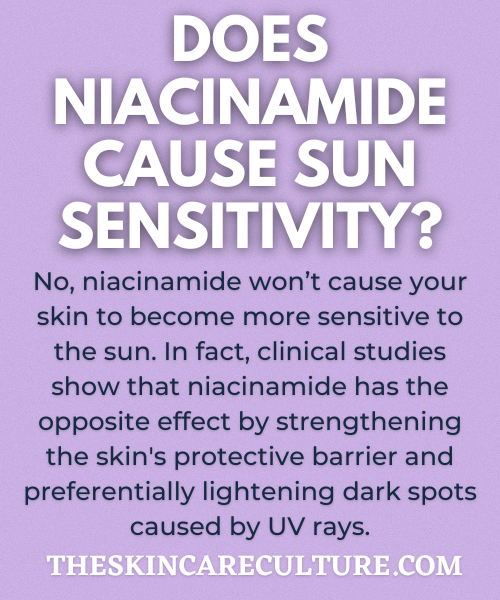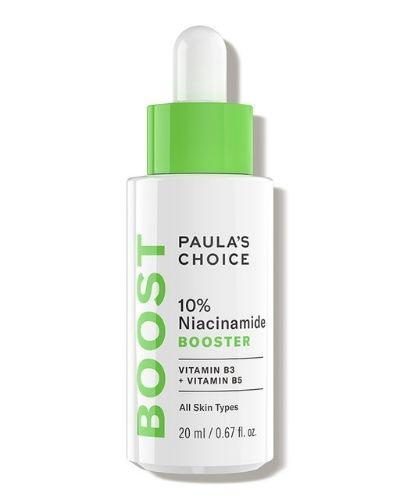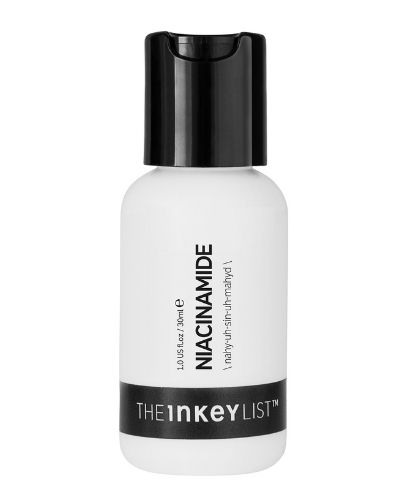Niacinamide, also known as vitamin B3, is an ingredient that has been used in skincare products for decades.
It’s found in many anti-aging products because of its ability to strengthen the skin barrier and provide a broad array of improvements in the appearance of aging skin, including a reduction in the formation of hyperpigmentation and blotchiness, as well as reduce the appearance of fine lines and wrinkles.
Besides that, niacinamide is especially loved by people with oily and acne-prone skin, myself included, due to its ability to balance out oil production and minimize active breakouts.
But besides all the benefits this ingredient has to offer, there are some concerns about niacinamide leading to sun sensitivity.
Therefore, in this article, I will explain what niacinamide is, how it works when used topically on the skin, and whether or not it causes sun sensitivity.

Does Niacinamide Cause Sun Sensitivity?
No, niacinamide won’t cause your skin to become more sensitive to the sun.
In fact, clinical studies show that niacinamide has the opposite effect on the skin by strengthening its protective barrier and preferentially lightening dark spots caused by the UV rays.
It’s important to note that niacinamide works by inhibiting melanosome transfer from melanocytes (pigment-producing cells) to keratinocytes (skin cells), which means it will stop the uneven deposition of pigment on a cellular level and eventually help brighten the already existing hyperpigmentation on the surface of the skin.

How is Niacinamide Beneficial to The Skin?

Niacinamide is truly a powerhouse agent with so many beneficial properties for the skin.
Niacinamide is not only beneficial for reducing hyperpigmentation, but it’s also an effective anti-inflammatory and anti-acne agent, and antioxidant.
Niacinamide can help reduce or completely prevent acne in some cases by inhibiting lipids in our sebaceous glands that contribute to acne formation while at the same time increasing ceramides which help the skin maintain optimal hydration levels.
This leads us to one of the most useful properties of niacinamide, which is the ability to improve epidermal barrier function by reducing trans-epidermal water loss and increasing the skin’s resistance to potentially harmful pathogens.
As it happens, once your skin barrier is strengthened, your skin will have an easier time dealing with other, minor issues such as redness and sensitivity, but it will also be more resistant to irritation and inflammatory conditions such as acne and rosacea.
Lastly, it is theorized that niacinamide can also improve uneven skin texture and can help refine and unify the complexion by speeding up epidermal turnover hence functioning as a mild exfoliant.
Using a multiple angle reflectance spectrophotometer in an in-vivo test of the back of the hand, two scientists established a beneficial effect for the topical application of niacinamide in smoothing the skin surface structure.
This study demonstrates that the long-term application of only 2.5% niacinamide can correct the skin surface damage that results from aging.
RELATED: Can You Mix Niacinamide & Retinol?
Does Niacinamide Help With Sun Damage?
Yes, niacinamide helps to reduce the appearance of sun damage and age spots by inhibiting the transfer of melanosomes from melanocytes to keratinocytes (skin cells) as explained above – therefore reducing the number of dark spots caused by over-exposure to UV rays.
In fact, clinical trials using only 2% niacinamide have shown that the ingredient significantly reduces the total area of hyperpigmentation and increases skin brightness after four weeks of treatment – this means it reduces both visible pigmentations and prevents future discolorations due to harmful UV exposure.
Lastly, niacinamide does not cause skin sensitivity or increased burning when exposed to sunlight; however, it does protect against further damage thanks to its antioxidant properties.
RELATED: Best Niacinamide Serums Under $30.
The Best Way To Use Niacinamide?

First, it’s important to note that products containing high concentrations of niacinamide can make the skin more sensitive to anything from UV radiation to other cosmetic products.
Note how studies showing niacinamide to be an effective ingredient for fading hyperpigmentation and refining uneven skin texture have only used 2-2.5% niacinamide.
In fact, niacinamide is exceptionally potent at concentrations of as little as 5%, so anything above that could, in theory, cause unwanted effects, such as sensitivity and irritation.
Therefore, the best way to use niacinamide is in low concentrations of 5-10% and to build frequency of use slowly.
Additionally, and as with everything else, avoid going out in the strong sun without adequate sun protection when introducing niacinamide into your skincare routine.
Sunscreen should always be worn during the day when exposed to sunlight; this will ensure optimal protection against harmful UVA and UVB rays while allowing any anti-aging or brightening benefits provided by topical skincare products containing niacinamide to take effect without causing increased burning or discoloration in the skin.
Conclusion
Does niacinamide cause sun sensitivity? No!
In fact, using beneficial amounts of this ingredient in skincare products helps protect the skin from future damage due to harmful UV rays while also reducing hyperpigmentation and evening-out skin tone.

My name is Simone and I am a certified skin specialist. I created this website to teach my readers how to take great care of their skin and I also like to occasionally share my honest opinions on skincare products I’ve tried. You can learn more about me here.
